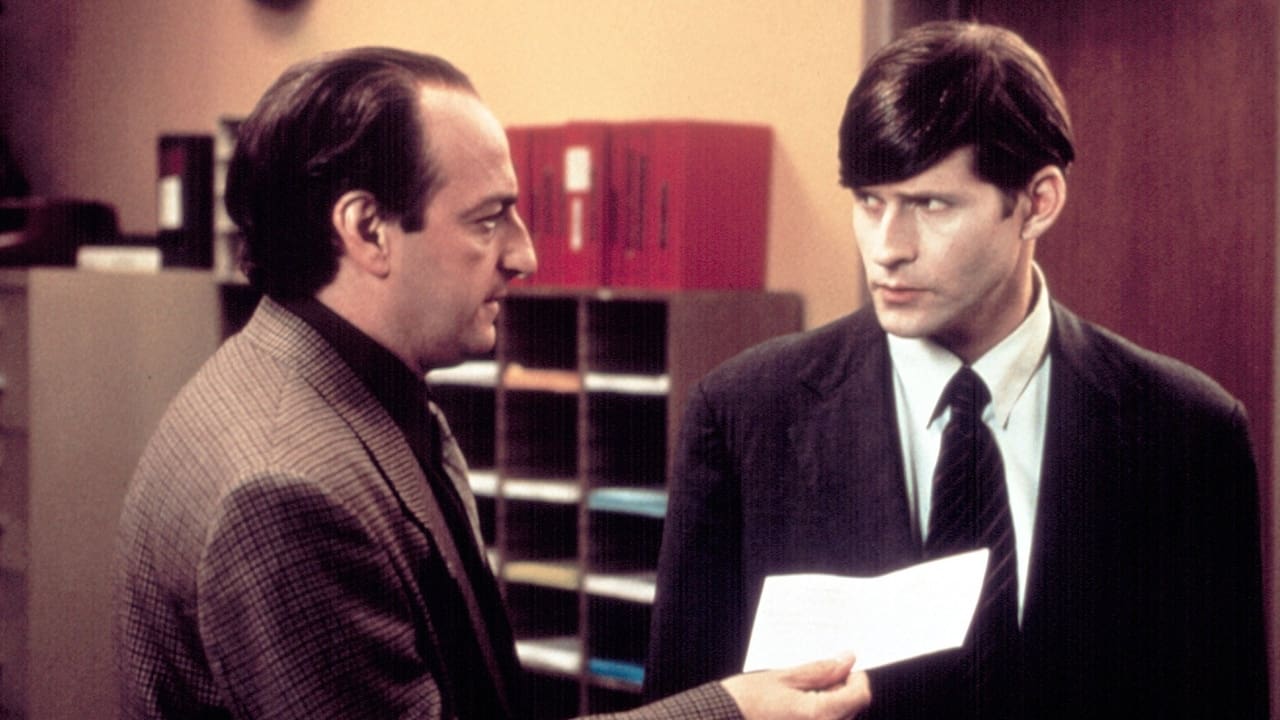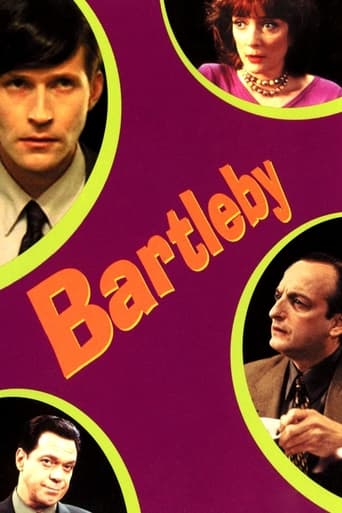

I never heard of this movie until couple of weeks ago when I saw it on TV. This brings my question - where do all the good, "small", independent movies go after they've been created and screened on the Sundance Film Festival? How do we learn about their existence? Where do we read about them? And most importantly, where can we see them? Bartleby, the first film directed and written by Jonathan Parker is a real gem - modern version of the Melville's short story "Bartleby the Scrivener" with absolutely amazing cast.Crispin Glover plays Bartleby, the man who was hired, but preferred not to work and who was fired, but preferred not to leave. David Paymer is his clueless boss who tries to understand what he is dealing with. Glenne Headly is Vivian, an office secretary, the woman of many adorable talents; Maury Chaykin, and Joe Piscopo are his coworkers in the one of the most boring office ever existed. The office is located in the building that sits on the top of the hill and comes directly from the El Greco's painting "View of Toledo" with its atmosphere of mystery, danger, and loneliness: Would you like to work in the building like that? I'd prefer not to...I believe Parker made a very impressive debut - the film is creatively shot, the use of music is amazing - Beethoven's sonata turns into a creepy, quirky and moody Bartleby's theme for which Parker used theremin - very interesting and unique musical instrument. Parker and his co -writer transported 'Bartleby the Scrivener' into a surreal and absurd black comedy - satire on bureaucracy and alienation in the insane and cruel modern world. Franz Kafka's name came to my mind more than once while watching the film - he would've loved that absurd, funny but dark and sad story. Also, if ever a good movie is made about one of the greatest and tragic writers of 20th Century, Crispin Glover should play him. Just compare their pictures...
... View MoreLike many people have said, I'd never heard of this film. Of course the fact that Crispin Glover stars in it made me rent it. The film's box had comments like "hilarious!", "An off-kilter delight." Off-kilter is a tame word to say the least. If you're looking for a film that's gonna make you laugh after a hard day - this is NOT it. It may cause you to become Bartelby.I'm not going to go over the plot as many reviews here already have. I'd just say that this is a VERY DARK movie, and morose at times. There are funny bits but they are creepy-funny. It IS worth seeing, because the acting is really good. But understand what this film really is - and that is: dark, surreal, strange and even a bit depressing. A great film if you're looking for something "weird" and "different" but don't expect knee-slappin' humor.
... View MoreThe phrase "I prefer not to" uttered by the titled protagonist is said with such honesty that it's hard to argue with it when it's spoken. This is a modern update of the Herman Melville story and I think the modern setting actually enhances the attitude of the story. Story is set in a Public Records Office and The Boss (David Paymer) is looking to hire someone to help out with the workload. He has a secretary named Vivian (Glenne Headly) who is very flirtatious and it's she that puts the ad in the paper for her boss. The other clerks are Rocky (Joe Piscopo) who is a male chauvinist and proud of it, and Ernie (Maury Chaykin) who is just incredibly inept and clumsy. After the ad hits the paper a man applies for the job. Enter Bartleby (Crispin Glover), a very quiet loner that wears the same suit and speaks very little. At first he works very well and files everything that he is suppose to but one day The Boss asks him to do something and he utters "I prefer not to". In fact, Bartleby stops working completely and when asked to do his job he repeats the phrase. The Boss fires him but he will not leave. Finally, The Boss moves the whole office to another building which leaves Bartleby with nowhere to go. *****SPOILER ALERT*****Bartleby becomes homeless and when The Boss tries to help he says "I prefer not to". Bartleby dies under a bridge while still wearing his suit. The Boss writes a novel about him and vows to make sure Bartleby's existence is not to be considered meaningless. The film is directed by Jonathan Parker and he shows some promising style to this low budget production. The look of the film is very colorful and most of the colors comes from the scenes inside the office, where the majority of the film takes place. Parker shows the office as the most insanely boring deadend job on the planet but the work environment of these poor clerks is decorated in bright colors and the outfits that the characters wear are unusually cheery. The story makes its point fairly early on and the big flaw of the film is that it overstays it's welcome. The Melville story is short and even though this film runs barely 80 minutes it seems a bit to long. But the big asset is the casting. Say what you will about the story, but Crispin Glover was born to play Bartleby. I just can't imagine another actor in this role. One of the things that I admire about his performance is that when he utters the phrase "I prefer not to" he does it differently each time. All with complete honesty but his tone, his inflection and his overall mood is different each time. This is not a great film with a great message but it is an interesting retelling of Melville's story of the common man trapped in a deadend job. The direction is spirited and Glover gives the perfect quirky performance that the film needed. It's well worth checking out.
... View MoreBased on the classic novella `Bartleby the Scrivener' by Herman Melville, but updated to reflect our current era, Bartleby features the always esoteric Crispin Glover in the title role. Depending on how you view it, Bartleby is either a protagonist or antagonist; a man who answers an ad for a `boring job, no room for advancement and low wages' who decides one day that he doesn't want to work anymore. Not only does he not want to work anymore, but he insists on coming to the office every day, and answers every request made of him with `I would prefer not to.' Bartleby appears to be short on substance, but is actually quite thought provoking. Not having read the Melville story, I cannot make comparisons between it and the film, but standing alone, the film was quite entertaining. The sparse yet colorful set design was a perfect compliment to the eccentricities of the film, and the cast was both surprising and intriguing. Crispin Glover has never yet failed a role and seems perfectly suited as the lead. The supporting cast includes many character actors, among them, Joe Piscopo an interesting but very appropriate choice in the role as the office blowhard.While this film will not entertain most, it is recommended for anyone looking for a quiet independent film that tells more of a story upon reflection than while actually experiencing it. --Shelly
... View More